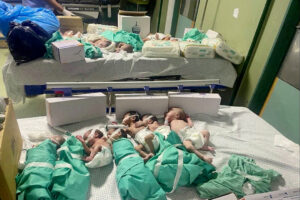GAZA — The tiny babies lie side by side, some wrapped in green fabric roughly taped around them for warmth, others wearing only nappies, a picture of vulnerability, their lives in grave danger with every minute that passes.
The newborns are under the care of exhausted medics at Gaza’s Al Shifa hospital, which is besieged by Israeli tanks battling Hamas fighters, and lacks electricity, water, food, medicines and equipment.
“Yesterday I had 39 babies and today they have become 36,” said Dr. Mohamed Tabasha, head of the pediatric department at Al Shifa, in a telephone interview on Monday.
“I cannot say how long they can last. I can lose another two babies today, or in an hour,” he said.
The premature babies, who weigh less than 1.5 kg (3.3 pounds) each and in some cases only 700 or 800 grams, should be in incubators where the temperature and humidity can be regulated according to their individual needs.
Instead, they had to be moved to ordinary beds over the weekend because of a shortage of electricity, said Mr. Tabasha. They were placed side by side, surrounded by packets of nappies, cardboard boxes of sterile gauze and plastic bags. “I never expected in my life that I would put 39 babies side by side on a bed, each with a different disease, and in this acute shortage of medical staff, of milk,” said Mr. Tabasha.
The infants are too cold, and the temperature is not stable because of power cuts, he said. In the absence of infection control measures, they are transmitting viruses to each other and they have no immunity.
He said there was no longer any way of sterilizing their milk and bottle teats to the required standard. As a result, some had contracted gastritis and were suffering from diarrhea and vomiting, which meant an acute risk of dehydration.
‘YOU SLOWLY KILL THEM’
Dr. Ahmed El Mokhallalati, also involved in caring for the babies, described the conditions as deadly.
“They are in a very bad situation where you slowly kill them unless someone interferes to adjust or to improve their situation,” he said, also by telephone from Al Shifa.
“These are very critical kinds of cases, where you have to be very sensitive in dealing with them. You have to take care of each of them in a very special way. Currently they are all in open space, they are all with each other,” he said.
Mr. Tabasha listed everything he would need to keep the babies safe: electricity to run the incubators, a proper sterilizer for the milk and bottle teats, medicines, and support machines in case any of them went into respiratory failure.
He said the situation was harrowing for the doctors and the four nurses in charge of the babies.
“We are exhausted emotionally and physically,” he said.
Israel launched its military assault to destroy Hamas, the Palestinian militant group which runs the Gaza Strip, after Hamas fighters rampaged through southern Israel on Oct. 7, killing civilians. Around 1,200 people died and 240 were taken hostage, according to Israel’s tally, the deadliest day in its 75-year history.
Since then, thousands of Gazans have been killed and more than half the population made homeless by Israel’s relentless onslaught. Gaza medical authorities say more than 11,000 people have been confirmed killed, around 40% of them children.
Israel says Al Shifa hospital sits atop tunnels housing a headquarters for Hamas fighters, who are to blame for its plight for using patients as human shields, which Hamas denies. — Reuters







